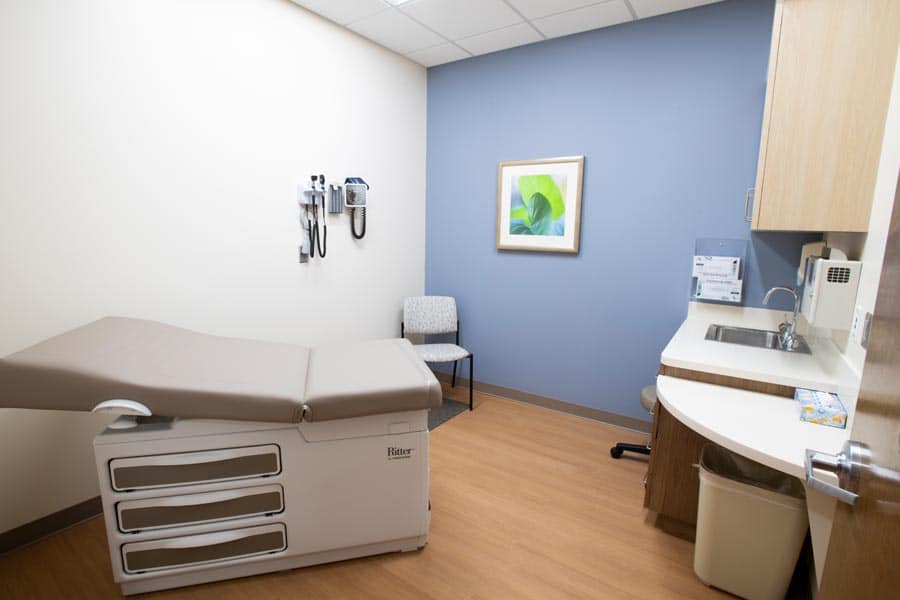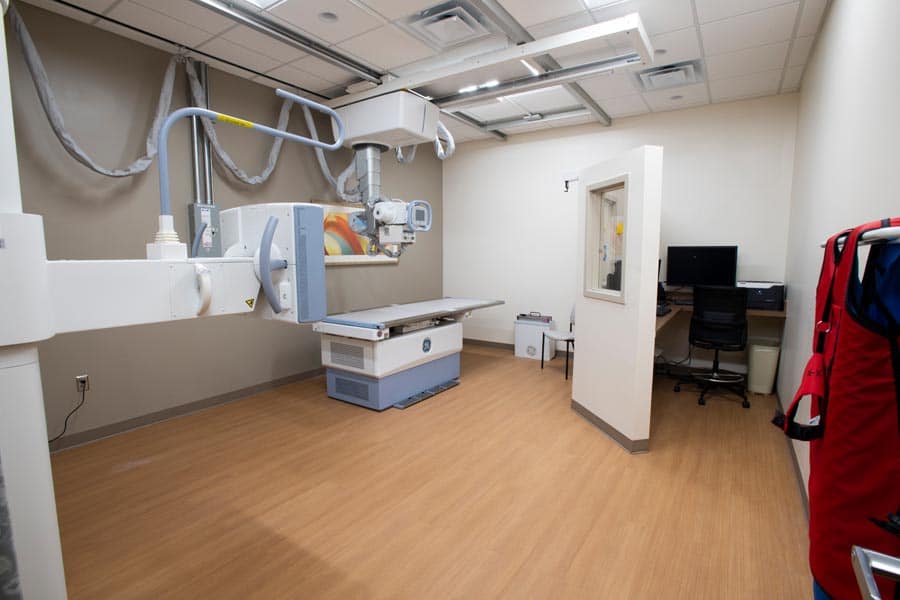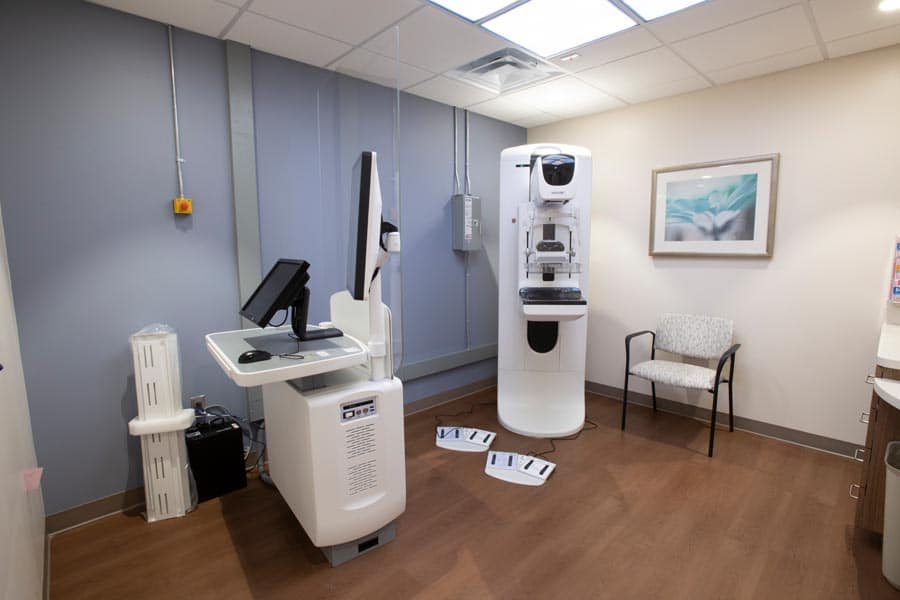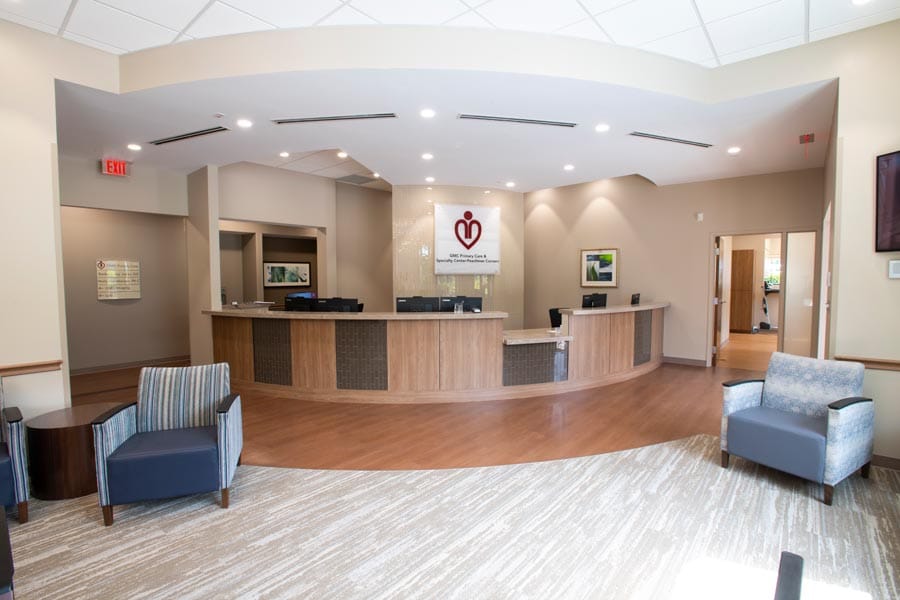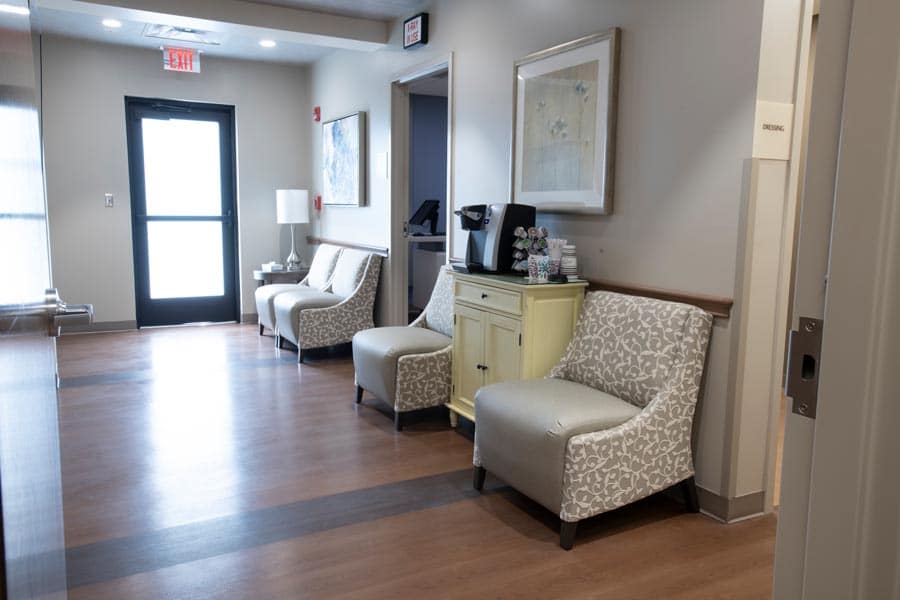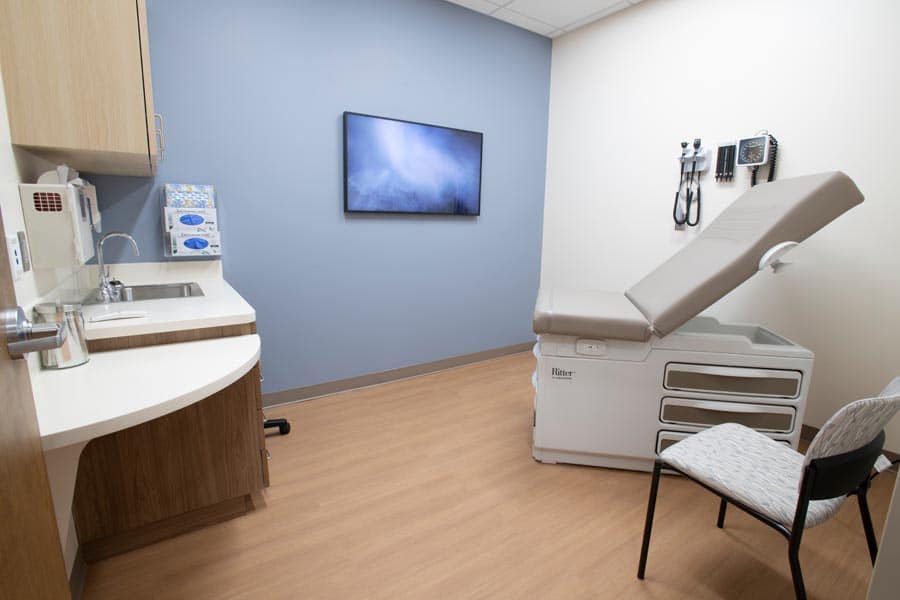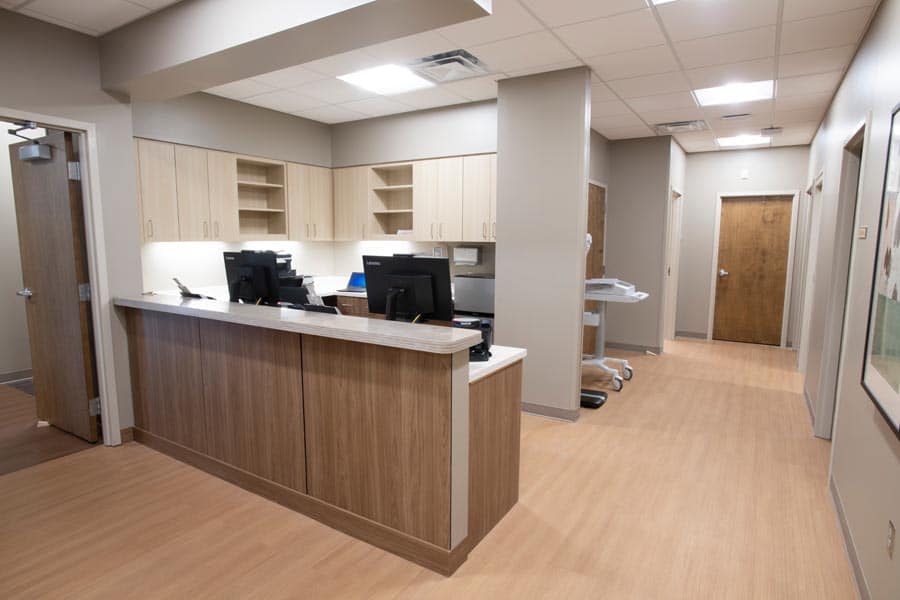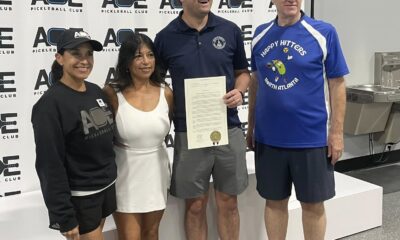Health & Wellness
Introducing Barbara Joy Jones, DO from GMC Primary Care & Specialty Center
Published
6 years agoon

In this episode of Peachtree Corners Life, Rico chats with Dr. Barbara Joy Jones, D.O. She is the lead physician at the new GMC Primary Care & Specialty Center. Barbara gives some insight into the field of medicine, diving into the similarities and differences of being a doctor of osteopathy versus doctor of medicine, the timeshare structure of their multi-specialty clinic, and the growing use of CBD in medicine. She also shares her personal journey into medicine, and we learn about how she went from pursuing a career in modeling to becoming a doctor.
“When I was younger – so my name is Barbara, and I have an Aunt Barbara who we call Aunt Babs, and my grandma was named Barbara as well. When I was younger, I used to give my grandma massages, and she told me, ‘You have healing hands.’ And at the time, I didn’t understand what that meant. I didn’t understand at the time. But it seemed as other doors were closed, path to medicine was open. It didn’t have its obstacles, but I got into medical school, I passed all the boards and I just – I had a heart for healing. And the gift of mercy. So I was – it was always important. And I really enjoyed people’s stories.”
Dr. Barbara Joy Jones, D.O.
Resources
GwinnettMedicalGroup.org/PTC
Phone: 678-312-8430
Barbara Joy Jones:
Facebook: Dr. Barbara Joy Jones
Instagram: @themodeldoc
Transcript of the podcast:
Rico [01:18 ]: Hi everyone, this is Rico Figliolini, host of Peachtree Corners life, and also the publisher of Peachtree Corners Magazine. We’re here with a special guest today. Her is Dr. Barbara Joy Jones, DO. And she is with the GMC Primary Care Provider that just opened. They took over – for those people in Peachtree Corners who know well, it used to be the old Ippolito’s restaurant. You would never know. I mean, they gutted out the whole thing, and it looks beautiful inside. We’ll show you some pictures later. But I’d like you to introduce yourself a little bit to the listeners, the audience here. Tell us a little bit about yourself.
Barbara [01:53 ]: Hello everybody, I am Dr. Barbara Joy Jones, thank you Rico for the introduction, and I am the lead physician at Primary Care and Multi-specialty Clinic in Peachtree Corners. We used to be Gwinnett Medical Center, and now we are Northside. This is day 2 of officially being Northside. And I am the lead physician, and I’m primary care, which means I’m diapers to depends, and I’m there five days a week. And then we have timeshares of specials that work on the other side. So we have gastroenterology, OBGYN, orthopedics, I think we’re bringing in neurology. And cardiology.
Rico [02:31 ]: That’s amazing. When I first visited, they had the great opening and, we walked through there, I found out there were time-sharing specialists? I didn’t realize that’s how some of these practices work. So they can be quite a few specialties, specialists, and you don’t have to leave the primary care facility.
Barbara [02:54 ]: Yeah, there’s been examples of a person who had a heart condition, very common atrial fibrillation, needed a heart check up. I finished my exam and walked them across the hall to the cardiologist. Easy.
Rico [03:05 ]: Okay, look at that. You don’t have to go out 30 minutes to somewhere else or make another appointment or something. Really great place. Tell us a little bit about you personally, too. Where you come from, who you are, a little bit about yourself.
Barbara [03:18 ]: Gotcha. So I am a military brat – Air Force. My father was in the air force, and I was born at West Point. Mother’s from Thailand. And I have three siblings – parents had four kids in five years. And I played basketball at Charleston Southern University in the Big South. So after three years, I told my dad – “Hey, I want to model and act,” so he sent me up to Los Angeles. And I failed at that. Door closed right away. So I was like, “Okay, well at least I tried.” And I went and finished my degree at Loyola Marymount University. So spent two years out there finishing my degree. And then moved back to Georgia, applied to medical school, and got into medical school in Gwinnett at the Philadelphia College of Osteopathic Medicine at Georgia campus, which has been open since 2005. And then, I renewed my lease to my apartment when I got accepted to Gwinnett Medical Center’s residency program for family medicine, and I was one of the five guinea pigs. The first five, and we were all women, and now there’s 61 residents on the campus, and two sports medicine fellows.
Rico [04:27 ]: So you live in Gwinnett County.
Barbara [04:29 ]: I do. I live in Duluth. I love Gwinnett. If I could be here lifelong, I would. And one thing I wanted to clarify – I have a DO behind my name. So the difference between a DO and MD is, there are a million fully-functioning physicians in the county, meaning can perform surgery, can deliver babies, can prescribe narcotics and Benzodiazepine. 108 thousand of us are DOs. So that means, in medical school, we learn manual manipulations. So 400 hours of something that I personally said is basically like chiropractic massage therapy and physical therapy all in one, as a physician. And we just augment care. So, an example would be, if a child comes in with an ear infection, if it’s bacterial infection, I would give the antibiotic, but I also have a way of manipulating trying to decrease the pressure and some of the pain by draining some of the fluid out of the eustachian tube, and that decrease of pressure actually helps the child feel better. And also helps the parents feel better cause their kid stops crying. So I am a DO, and starting in 2020, DOs and MDs will have one accreditation. Meaning one match process. We all train side by side currently. But in the future, in 2020, it would be one match.
Rico [05:50 ]: So other than surgery, or, not surgery – if you compare yourself to a general practitioner, let’s say, for lack of a better phrase, what are the differences then?
Barbara [06:02 ]: Well, okay. So 56% of DOs go into primary care, which consists of internal medicine, family medicine, and peds. The others go into whatever they choose. Cardiology, neurosurgery, orthopedic surgery, and they never use their hands ever again. They just practice like an MD.
Rico [06:21 ]: So you’re along the same lines as an internist to a degree? Or, there’s other –
Barbara [06:25 ]: Well, MDs and DOs are fully functioning physicians and can go to any residency. We are just trained, the mind and the body, you know – you just catalyze that the body will heal itself. Just a more holistic thought process. But we can practice in any form of medicine.
Rico [06:45 ]: So how long has this – I mean, there’s a trend on doing this, right? G – Gwinnett Medical – you know, it has expanded, and there’s quite a few facilities in Gwinnett County. I know there was none on this side of the county, and that’s why GMC opened over here. Are all the facilities similar to that degree, with DOs and such?
Barbara [07:09 ]: DOs can practice just like MDs. You’ve probably been treated or done surgery with a DO. You just don’t know unless you look behind their name. We practice the same. It’s just that, a lot of us, more than half, choose to go into primary care. We just have the heart for primary care.
Rico [07:27 ]: So how long have you been doing this now?
Barbara [07:30 ]: Um, graduated from medical school in 2014, graduated from residency 2017. So I’m entering my third year of attendinghood. Being an attending physician. I practice on my own.
Rico [07:40 ]: So do you learn a lot more with, I mean, obviously the amount of residents has expanded there. I mean, is it your colleagues – do you get together? Do you talk about things going on in medicine and community?
Barbara [07:54 ]: Well, I am an attending. I actually teach the residents. So because I am proficient in osteopathic, manipulative treatment, which is that manual manipulation, and half of the residents in the family of medicine are MD and half are DO. The DOs currently need to have a certain amount of osteopathic, manipulative treatment training. So I teach them that. So what we – yeah. I teach them as an attending. So I get to see them once a week – it’s Wednesdays. And other than that, we do have CMEs. So physicians are required to do a certain amount of learning new things in medicine to stay up on the times.
Rico [08:34 ]: So if people come to the – this side here on Peachtree Corners, then they’re gonna see you on a regular basis. You’re out there regularly. You’re the lead, obviously.
Barbara [08:44 ]: Yes, I’m the lead physician, so I see diapers to depends. I do pap smears, I work on mammograms, I do prostate exams, I do child vaccinations, child wellness exams, annuals, preventative exams, acute visits if you have sinusitis, gastroenteritis, diarrhea, I got you. Sprained your ankle, I got you. Possibly pneumonia, I got you. We have a chest x-ray machine.
Rico [09:09 ]: Yeah, you don’t have to go far. You don’t have to leave the city of Peachtree Corners. And it’s an interesting city because, for as much as is 44,000 odd people that live in the city, there’s 87% of the people that work in the city don’t actually live in the city. They leave the city, go back home to wherever they go. So, I mean, corporate health, does that reach to what you want to say?
Barbara [09:35 ]: Yes. That was part of the model. So, I don’t know about Northside, but for Gwinnett Medical Center, and we just became Northside yesterday, we had one facility in Sewanee that was a multi-specialty clinic that was successful. So they modeled my clinic, which opened on August 5th, after that. Where you have primary care there, and then you have five or six different other specialties that time share during the week.
Rico [09:59 ]: Right. And corporate health –
Barbara [10:00 ]: Yes. That is part of it. So the hospital is working on corporate health where people would be able to come in and get their physicals done with me.
Rico [10:11 ]: You know, you’ve been a lot of different things, which is cool. It’s a well rounded person that you are by doing that. What I’d like to ask you is, what brought you – what got you to pursue the medical part of it? The medicine part? I mean, you were acting, modeling a bit. What turned you onto medicine?
Barbara [10:36 ]: When I was younger – so my name is Barbara, and I have an Aunt Barbara who we call Aunt Babs, and my grandma was named Barbara as well. When I was younger, I used to give my grandma massages, and she told me, ‘You have healing hands.’ And at the time, I didn’t understand what that meant. I didn’t understand at the time. But it seemed as other doors were closed, path to medicine was open. It didn’t have its obstacles, but I got into medical school, I passed all the boards and I just – I had a heart for healing. And the gift of mercy. So I was – it was always important. And I really enjoyed people’s stories.
Rico [11:13 ]: You know, that’s interesting. It almost seems like you were guided that way without even realizing.
Barbara [11:18 ]: Right. So people ask – was there a time? I can’t remember just an epiphany – oh you’re supposed to be a doctor. It was like, the path was paved, and it was a little bit easier – and not easier, but just directed in this path where everything else, the doors were closed immediately in my face.
Rico [11:34 ]: You know, it’s funny because Malcom Gladwell – he wrote several books about leadership and stuff, and one of the things he mentions is, you need the little nudges, not things – that huge that comes across. It’s always those little nudges, the right people that talk to you at the right moment, that get you sort of moving along that path over a period of time. So that’s kind of nice to be able to see that. So the professional journey so far that you’ve experienced. Do you have any anecdotes that you want to share about, you know, getting into it, what stories you may have on it?
Barbara [12:13 ]: Well, I guess more so, like, testimony of when I got into med school, there were only two spots left, and I got one of them. So I almost didn’t even get into that class.
Rico [12:22 ]: So that was the Philadelphia –
Barbara [12:24 ]: The Philadelphia College of Osteopathic Medicine, Georgia Campus. It’s in Sewanee, off of Peachtree Road. Take 85 N and take 109. Go right.
Rico [12:31 ]: You know it well.
Barbara [12:33 ]: Yes. But having – but getting in – that was, I was very thankful. Because with as much work as it took, I was very thankful that I had the capacity, the intelligence, and the wherewithal and the health to go through it. Cause it’s very stressful. And then even in residency, having had difficulties there with certain subjects, I would have trouble learning, but the residency did a very good job of giving me opportunities to go above and beyond to learn. So those obstacles, and to make it through, and by the end of residency in 2017, I was named resident of the year. So overcoming those obstacles and using that as a platform to become great in my field.
Rico [13:21 ]: I mean, determined too. Because lots of young people would drop out, or maybe chemistry’s not their thing, maybe biology, maybe whatever they’re learning could be tough. And they find out it’s not for them.
Barbara [13:37 ]: The cliche. It could have made me or it could break me.
Rico [13:40 ]: Exactly. That you go in there like that. So the role that we discussed for a little bit. So what excites you and motivates you when you, you know, your day off? Do you think about medicine all the time?
Barbara [13:56 ]: No. When I go home, I have a lot of really good friends and family, so I enjoy spending time with them. So that would include having love and fellowship over a nice meal. I play basketball, so there is a league in perimeter. I play D1 Georgia Sports League. And sometimes I’ll join one of the seasons and play basketball with girls who were active in college or overseas and want to stay active in their 30s and 40s, so I enjoy that. What else?
Rico [14:27 ]: That’s good. And you’re a doctor, so you can always see if you’re not feeling well or stress in your bones.
Barbara [14:33 ]: And I enjoy traveling as well. Whether it be out of town or just staycation just to enjoy different parts of Atlanta.
Rico [14:40 ]: Have you been to places where you might have, I mean, I’m sure on vacation you don’t go visit medical facilities, but being in the industry and stuff, do you see anything in other cities, other places, other countries that you may have visited, where you might look at that and say –
Barbara [15:00 ]: Anytime I go overseas and come home, I’m always very thankful for our healthcare system. I just think like that.
Rico [15:06 ]: Alright. With the emerging technology and research, and the techniques that are out there, are you excited about anything particular out there in the future that’s coming that you see? On the horizon maybe?
Barbara [15:21 ]: The one thing that comes to mind is CBD oil. That’s a new thing.
Rico [15:27 ]: Yes, now, okay. Some one I know would like to use it, and but she’s not feeling that maybe would help that. So how would that work? Is that something that you even can recommend in your practice?
Barbara [15:43 ]: It is legal in all 50 states. So you don’t – we’ll prefer someone who is knowledgeable to tell you how to start to take it as a supplement. It is legal – you do not need a prescription, but it is legal in all 50 states.
Rico [15:59 ]: So is that something you would recommend to someone? If you felt they needed it?
Barbara [16:03 ]: If someone has pain or trouble sleeping and relaxation, they’re looking for that, yes, I do recommend it for pain, relaxation, and sleep. We do have endocannabinoid receptors in our body, so there’s a place for them to go. And, just like, say somebody is vitamin D deficient, they would take a vitamin D supplement. If you’re deficient in endocannabinoids, you would take it as a supplement.
Rico [16:31 ]: Do you find that it helps – I mean, some people I would imagine just like pharmaceuticals. Pharmaceuticals, when they come out, maybe 50, 80% of the people that take it, it helps. And maybe the other 20, 30 it doesn’t, because that’s just the way things are.
Barbara [16:45 ]: Well, if your issue – it could be possibly due to endocannabinoid deficiency – the top 4 things that it would be would be migraines, fibromyalgia, anxiety, depression, refractory to treatment, and irritable bowel syndrome. A lot of times, those patients really would do well with it. Also, cancer patients dealing with pain – it’s always good for them to take it as an option. But there’s rules to it. You want to make sure it’s bought in the USA. Made and bought in the USA. Organic, and in full spectrum without the THC, because, you know, the THC portion is psychoactive, and we’re not trying to do that. We’re just trying to get the benefits of the endocannabinoids.
Rico [17:26 ]: That’s right, that’s right. The legal part anyway doesn’t have any of that. Or at least that’s the smallest percent anyway.
Barbara [17:32 ]: Well if it’s full spectrum, and you don’t want the active THC, it’s gonna have a 0.0002 or 3 percent. But yeah. It’ll have a tiny, tiny bit, but not enough that it will cause any psychoactive effects.
Rico [17:48 ]: I’m sure there are people out there that may, I mean there’s so many places that sell it, so you’re correct in saying to investigate what you’re getting.
Barbara [17:57 ]: Yes. You definitely want to investigate where you’re getting it from.
Rico [18:03 ]: Because there’s too many places. Like, even gas stations. I mean, there’s too many places –
Barbara [18:05 ]: Don’t get it from a gas station. It is worth spending the extra money to make sure it’s USA grown, organic, full spectrum, active THC.
Rico [18:11 ]: I think there is a local pharmacy that sells it. Not a chain pharmacy, a local compound pharmacy that sells it also. So, tell me a little bit more about, just a little bit more about the facilities here in Peachtree Corners, and we’ll share some of those pictures of – and I know you hit upon it before a little bit, but let’s talk about that.
Barbara [18:33 ]: So the facility has a primary care pod, and that’s where I am. And then there also is a physician’s assistant – her name is Molly, and she’s with us on Wednesdays, Thursday mornings and Fridays. And I’m there all five days. And we have our six rooms, beautiful rooms, and it has a spa type feel as soon as you walk in.
Rico [18:54 ]: Hospitality, yes.
Barbara [18:55 ]: Right. So when you come in, there’s also a pod for the specialists. So each morning, each afternoon, you’ll have a different specialist that time shares for that morning or afternoon if you’re there for that. And then for us, when I’m back in our little pod, and if you need a mammogram or xray, we have that capability as well.
Rico [19:15 ]: And I understood from the visit when I went there that the, I guess it’s the mammogram, it’s a 2D and a 3D machine. So for those people that might need a 3D – so what’s the difference between the two? Can you share that as far as 2D, 3D?
Barbara [19:34 ]: From what I know, and I’m not an expert on it, you can see things better because it’s 3D versus 2D. I can talk to a radiologist and I can get back to you.
Rico [19:46 ]: No, you’re good, you’re good. So it’s true, if you have thick tissues and stuff like that, 3D is really the way to go. And it’s interesting that it’s the same machine that’s doing it, so, so it’s there. So, I mean, you know, if I remember taking my in-laws to the doctor sometimes if they had to go get an xray, they had to leave where they went, go somewhere else – this is all in one place.
Barbara [20:13 ]: It’s really convenient. Someone comes in and to rule out pneumonia, we can send them down the hall to get a chest x-ray. And if a woman needs a mammogram, we can send her down the hall. And if at that particular time, the specialist that’s time sharing at the time you need, you can just walk on over. Dr. Tonya Ruttledge is the gastroenterologist, so if someone needs a colonoscopy, we can just take them over to do their consult. And Dr. Donroe is the cardiologist. He’s there on Tuesday afternoons. I’ve walked a couple people down to him as well.
Rico [20:44 ]: So do they do that stuff there as well? Colonoscopy down there also?
Barbara [20:47 ]: No. They have either in the hospital or an endoscopy suite.
Rico [20:53 ]: Right. That makes more sense. And I know they keep telling me, I’m over 50 and I need to do that.
Barbara [20:59 ]: Yes. It’s very important. Colon cancer is preventable with a colonoscopy. You can get the polyps removed.
Rico [21:05 ]: Is there anything you want to share with us a little bit more about the facility or the way GMC – I mean I know Northside took over a couple days ago, and we don’t know yet how that’s gonna affect things, but certainly the GMC, Gwinnett Medical sign is still out front.
Barbara [21:25 ]: Yes, yes, yes. They chose to plant feet here because it was a primary care desert, and we’re here to serve the community. So we are open and you guys should call and get an appointment. 678-312-8430. Come on in.
Rico [21:43 ]: Is there a website also? There’s a website I think, right?
Barbara [21:44 ]: Yes. It’s GwinnettMedicalGroup.org/PTC. But I don’t know if that’s gonna change, if we’ll become a Northside website. So stay tuned.
Rico [21:54 ]: Okay. And I imagine if that changes, they’ll probably forward that URL.
Barbara [21:57 ]: Yes.
Rico [21:59 ]: So that should be fine.
Barbara [22:01 ]: Mail forwarding to the new website.
Rico [22:01 ]: And if you want to follow – is there any way they can follow you?
Barbara [22:08 ]: So my instagram is @themodeldoc. Yeah. The Model Doc. Very simple. And on Facebook, Dr. Barbara Joy Jones.
Rico [22:20 ]: If you have any more questions that you want to put to the doctor, you can put them in the comments. She’s liked the page, so she’ll get noticed when those comments are made. And if you want to field visit there, like she said, five days a week. Just go make an appointment and you can go out there. This has been Peachtree Corners Life with Dr. Barbara Joy Jones, DO. Appreciate you coming in.
Barbara [22:50 ]: Thank you, I enjoyed it.
Related
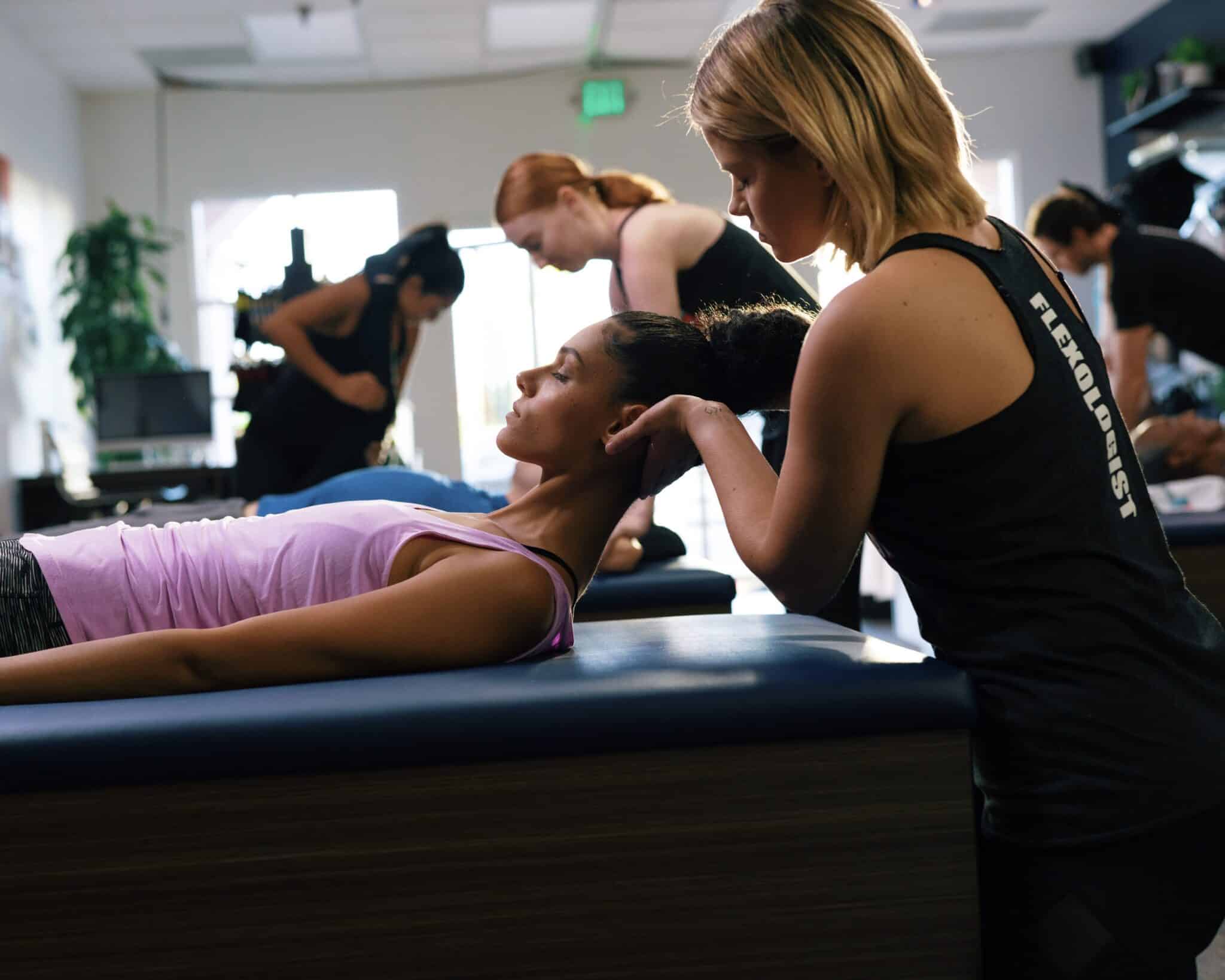
The Forum in Peachtree Corners features a variety of businesses focused on health and wellness, offering services designed to meet individual needs. From fitness programs and recovery treatments to relaxation and aesthetic care, each business prioritizes physical and mental well-being.
StretchLab
StretchLab offers personalized stretching sessions to improve flexibility, mobility and overall physical health. Each client’s journey begins with a focus on their goals, whether it’s enhancing athletic performance, reducing stress or relieving pain.
“We dive into understanding each individual’s physical and mental needs to craft the perfect stretch experience,” said franchise owner Ghada Kheirbek.
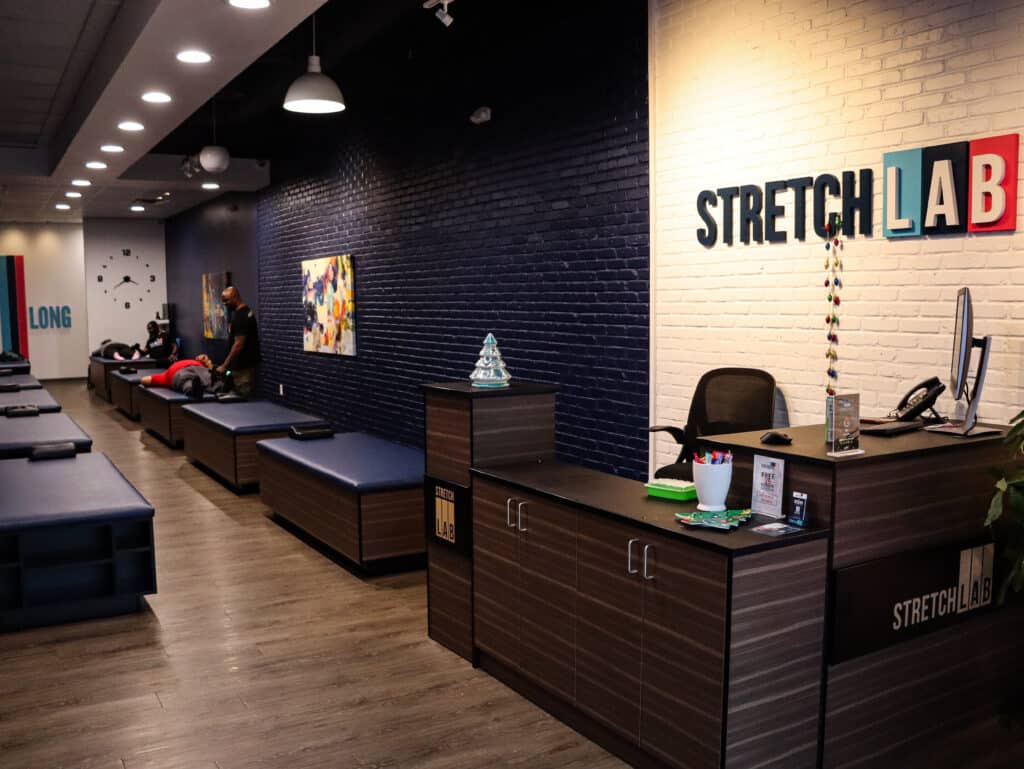
StretchLab’s MAPS technology sets it apart, analyzing Mobility, Activation, Posture and Symmetry using advanced tools. This allows flexologists to create custom plans tailored to individual progress. Sessions incorporate Proprioceptive Neuromuscular Facilitation (PNF) techniques, combining muscle activation and deep stretching for long-term results.
“Our approach focuses on areas you can’t stretch on your own, unlocking better movement and relief,” Kheirbek explained.
Community engagement is a priority, with partnerships with local schools, yoga studios and organizations.
StretchLab is located at 4880 Peachtree Parkway, Suite 1125, Peachtree Corners, GA 30092. For more information or to schedule a session, visit stretchlab.com/location/peachtree-corners or call (470) 410-6664.
Dermani MedSpa
Dermani MedSpa provides medical-grade aesthetic treatments, including facials, Botox and laser hair removal. The medspa focuses on enhancing natural beauty while prioritizing safety and comfort, offering services performed by highly trained staff in a professional, welcoming environment.
Each treatment is tailored to individual needs, ensuring clients achieve results aligned with their goals. Clients value the medspa’s attention to detail and commitment to quality, making it a trusted choice for aesthetic care.
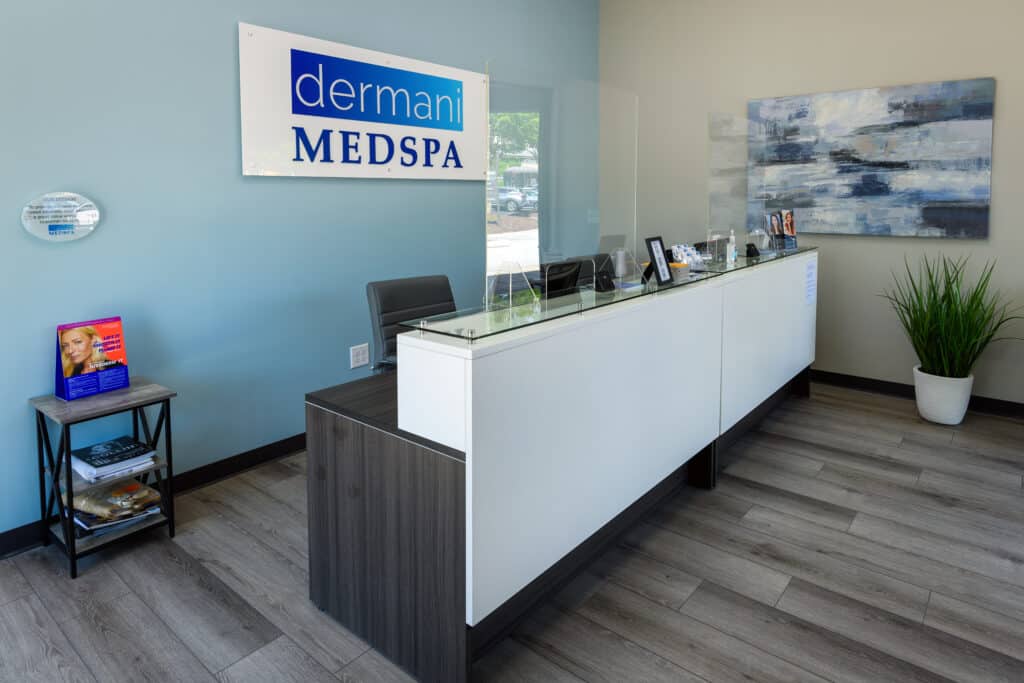
“Dermani offers a variety of medical-based aesthetic treatments,” said Charlotte Hinton, marketing manager at Jamestown, The Forum. “Outside of just loving their team as a whole — their girls are the best — my colleagues and I love to see them for facials, Botox and laser hair removal.”
The medspa’s reliable, results-driven services cater to clients seeking everything from routine skin maintenance to advanced aesthetic solutions.
Dermani MedSpa is located at 5165 Peachtree Parkway, Suite 230, Peachtree Corners, GA 30092. To schedule an appointment or learn more, visit dermanimedspa.com/peachtree-corners-norcross or call (404) 383-1108.
The NOW Massage
The NOW Massage is more than just a spa; it’s a tranquil retreat designed to help clients disconnect from daily stress and reconnect within. The massage studio has a serene atmosphere inspired by beachside destinations.
“In today’s fast-paced, digitally driven world, self-care is no longer a luxury but a necessity,” said Gara Post, co-founder of The NOW Massage.
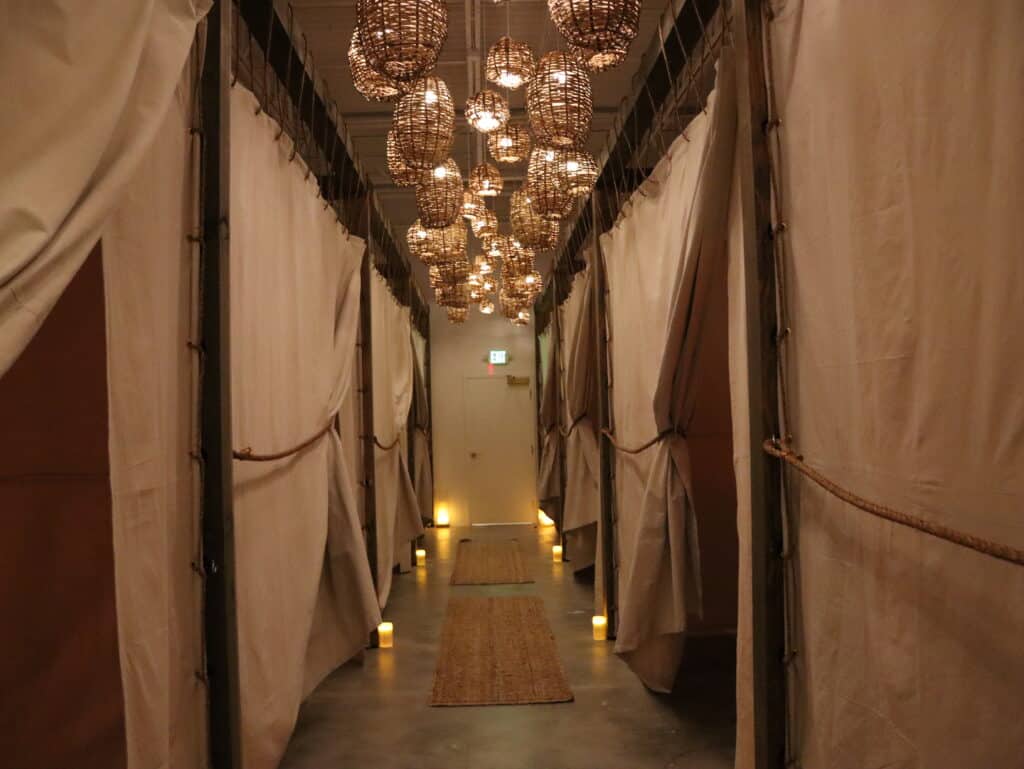
The NOW’s thoughtfully curated menu features three signature massages: The NOW, a relaxation-focused experience; The HEALER, which balances energy and reduces stress; and The STRETCH, a recovery-focused massage ideal for active lifestyles. Enhancements like Herbal Heat Therapy, Deep Tissue and Gua Sha allow clients to customize their experience.
“Our therapists undergo advanced training to ensure each session is tailored to individual needs,” explained Devin Borland, franchise owner.
Community involvement is central to The NOW’s mission. The studio supports first responders, recognizes educators and participates in local wellness events. “We’re proud to be part of the Peachtree Corners community,” Borland added.
The NOW Massage is located at 5161 Peachtree Parkway, Suite 615, Peachtree Corners, GA 30092. For appointments, visit thenowmassage.com/peachtree-corners or call (678) 615-3375.
Alloy Personal Training
Alloy Personal Training is redefining fitness in Peachtree Corners with a personalized approach tailored to help clients achieve lasting health and wellness.
“Our goal is to create a sustainable fitness journey for every individual, no matter where they’re starting,” said Margaret Bruemmer, fitness director at Alloy Personal Training.
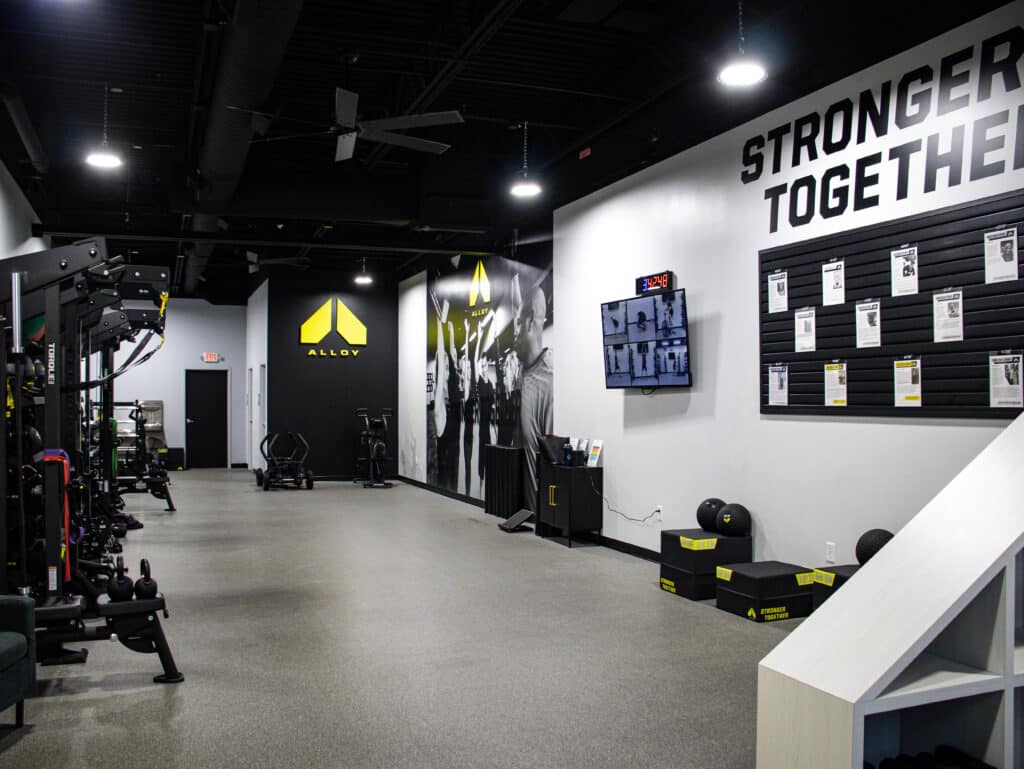
At the heart of Alloy’s method is the Functional Movement Screen (FMS), a comprehensive evaluation tool that assesses a client’s current fitness level. This process ensures that every workout is not only effective but also safe.
“We use FMS to identify a client’s unique needs and design a program that works for them,” Bruemmer explained.
Trainers provide one-on-one guidance, helping clients navigate structured routines that focus on proper form, technique and measurable progress. Each session builds confidence while addressing individual health goals.
Located at 4880 Peachtree Parkway, Suite 1135, Peachtree Corners, GA 30092, Alloy Personal Training offers flexible hours to accommodate clients’ busy lifestyles. To learn more or schedule a consultation, visit alloypersonaltraining.com/location/alloy-peachtree-corners-ga or call (678) 578-4984.
Club Pilates
Club Pilates combines timeless Pilates principles with innovative techniques to offer a holistic approach to fitness and wellness. The studio provides a welcoming environment for clients of all fitness levels, ensuring that everyone can benefit from the practice.
“Pilates is about more than just fitness — it’s about helping our members discover balance, both physically and mentally,” said Victoria Steere, director of community engagement.
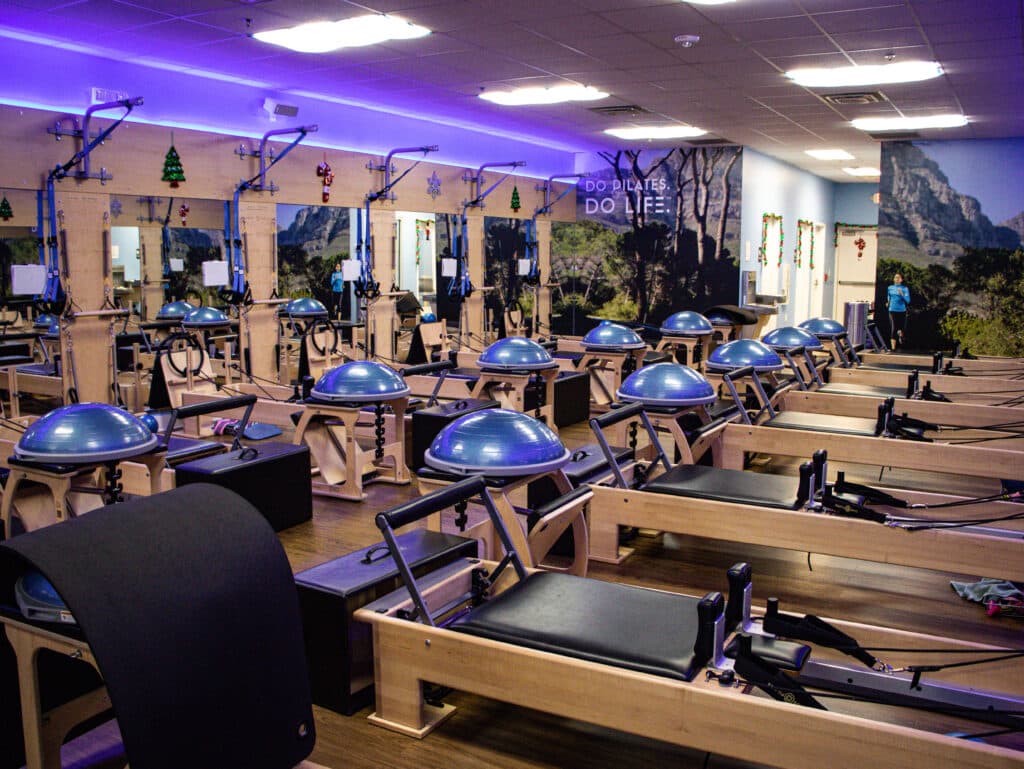
Each class is tailored to individual needs, with certified instructors guiding clients through sessions that improve posture, core strength and overall body awareness. Whether it’s a high-energy cardio class or a gentle stretch-focused session, Club Pilates helps clients achieve their fitness goals while promoting mindfulness and intentional movement.
“Many of our members describe their time here as an essential hour of self-care, a break from their busy lives,” Steere added.
By integrating physical and mental balance into its classes, Club Pilates empowers clients to leave each session feeling stronger, more confident and recharged.
The studio is located at 4880 Peachtree Parkway, Suite 1130, Peachtree Corners, GA 30092. For more information or to schedule a session, visit clubpilates.com/location/peachtreecorners or call (404) 902-2583.
Icebox Cryotherapy
Icebox Cryotherapy brings innovative recovery and wellness treatments to Peachtree Corners, offering clients a practical way to rejuvenate their bodies and manage stress. Specializing in full-body cryotherapy, cryofacials and compression therapy, the studio is a haven for those seeking to reduce inflammation, improve circulation and enhance overall physical performance.
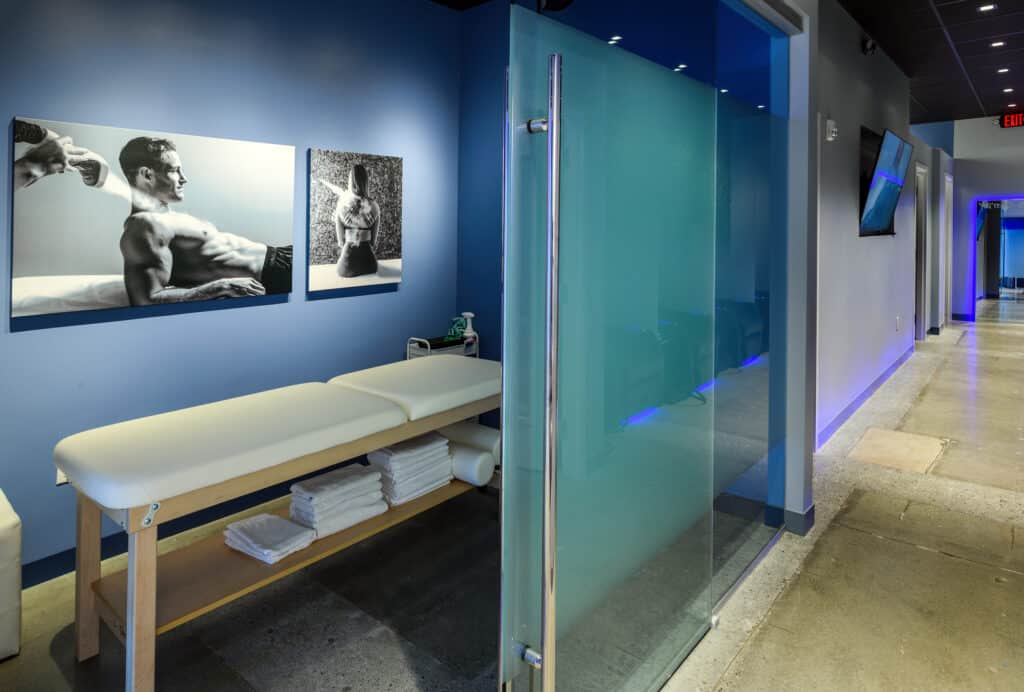
Full-body cryotherapy sessions expose the body to controlled cold temperatures, stimulating a natural response that accelerates recovery and reduces tension. Cryofacials, on the other hand, provide a gentle way to refresh the skin, diminish puffiness and promote a youthful glow. For athletes or individuals managing chronic muscle stress, compression therapy targets specific areas to relieve tension and improve mobility.
“They’re a fantastic option for anyone looking to rejuvenate their skin while managing stress,” shared Hinton.
Located at 4880 Peachtree Parkway, Suite 1120B, Peachtree Corners, GA 30092, Icebox Cryotherapy invites clients to experience their transformative services. For appointments or more information, visit iceboxtherapy.com/peachtree-corners-ga or call (678) 284-2570.
Perspire Sauna Studio
Perspire Sauna Studio is set to redefine wellness in Peachtree Corners, combining ancient practices with modern technology to create a sanctuary for self-care. Offering infrared sauna therapy, red-light therapy and contrast therapy, the studio is designed to help clients detox, de-stress and recharge.
“We’re bringing cutting-edge wellness options to the community, creating a space where self-care becomes a part of your weekly routine,” said Amanda Arboleda Ridley, studio owner.
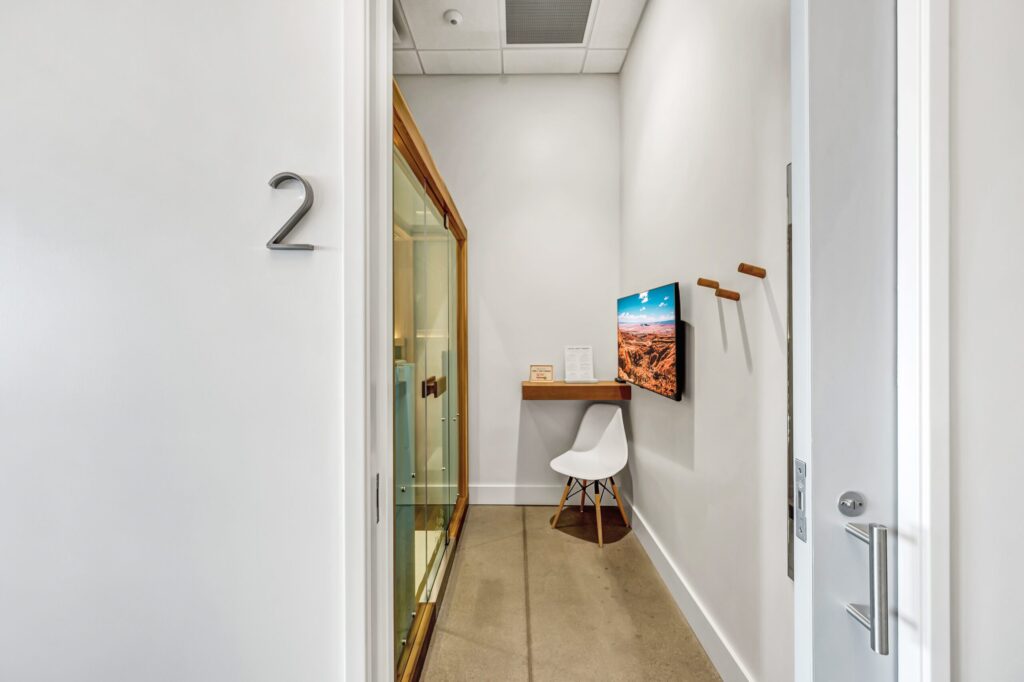
Infrared saunas use controlled heat to promote detoxification and improve circulation, providing both physical and mental health benefits. Red-light therapy enhances skin health and stimulates cellular repair, while contrast therapy alternates between hot and cold treatments to invigorate the body and strengthen the immune system.
“Whether it’s a deep detox, improving your skin or just carving out 40 minutes of uninterrupted ‘you’ time, we help clients feel their best,” Ridley explained.
For those seeking a tranquil environment to reset and recharge, Perspire Sauna Studio offers a personalized experience tailored to individual wellness goals.
The studio will be located at 4880 Peachtree Parkway, Suite 1120A, Peachtree Corners, GA 30092. For updates and inquiries, visit their website, perspiresaunastudio.com/ga/peachtree-corners, or contact them directly.
Related
City Government
City of Peachtree Corners Awarded Health Wellness Grant
Published
6 months agoon
November 7, 2024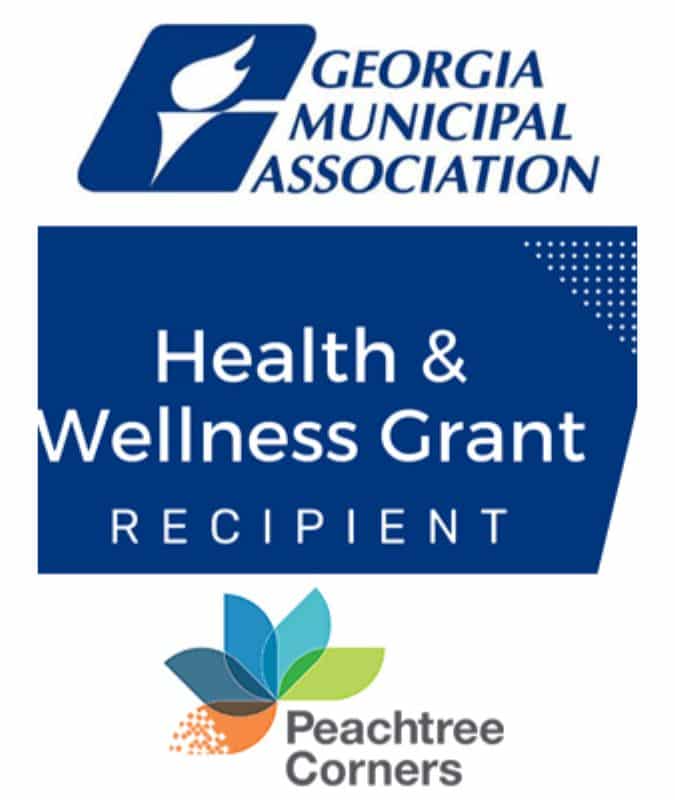
The City of Peachtree Corners has been awarded one of the 2024 Health Wellness Grants by the Georgia Municipal Association (GMA). The grant supports the city’s commitment to facilitating positive change in workplace culture and going the extra mile for employees’ health and wellness.
GMA is honored to collaborate with the City of Peachtree Corners at every step of their health wellness journey. Awards are made statewide to participating employers enrolled in one or more medical plans through the Georgia Municipal Employees Benefit Services (GMEBS) Life and Health Insurance Fund.
The Health Wellness Program at GMA helps members embrace a variety of skills, mindsets and cultures to encourage utmost well-being through workplace health wellness initiatives. These initiatives have demonstrated a track record of improving employee well-being and quality of life while enhancing workplace morale, reducing medical claims and maximizing cost impact.
“As a city, we are committed to fostering an environment where our employees’ health and well-being are a top priority,” said City Manager Brian Johnson. “This grant will enable us to build on our efforts to create a workplace culture that not only promotes wellness but also empowers our staff to make healthier lifestyle choices every day. Our employees are our greatest asset, and investing in their well-being ultimately benefits both the City of Peachtree Corners and the community we serve.”
Workplace health wellness
The City of Peachtree Corners has designated a Health Wellness Champion to coordinate/oversee the program and work in partnership with GMA to facilitate the planning of targeted activities. Jennifer Bonacci, assistant finance director, has expounded on how the City of Peachtree Corners will benefit from implementing workplace health wellness initiatives.
“We are excited to use our grant money to help make a difference in the lives of our employees by creating an atmosphere of health and wellness,” said Bonacci. “Adult fitness opportunities are often put on the back burner due to work schedules, long commutes and family obligations. We hope to enable our employees to make small choices each day to increase their overall health and wellness and build a community of support and encouragement around health and wellness.”
For more about the City of Peachtree Corners, visit peachtreecornersga.gov/1/Home.
To learn more about GMA’s Health Wellness Program, visit them online here.
Related
Health & Wellness
The NOW Massage Opens Peachtree Corners Boutique at The Forum
Published
7 months agoon
October 15, 2024
Grand opening set for October 21
The NOW Massage, a growing wellness franchise offering high-quality, affordable massage services in a chic, inspired setting, will open its first Peachtree Corners location on Monday, October 21. The boutique, located in a 2,414-square-foot space at The Forum, is owned and operated by area residents Devin and Amanda Borland, who also own and operate The NOW Massage Roswell. They bring over a decade of sales and customer service experience to their franchising journey with The NOW.
“After building a loyal following of guests and Ritual Members at our Roswell boutique, we look forward to introducing Peachtree Corners to The NOW’s menu of customizable massages, monthly memberships and nourishing products,” said Devin.
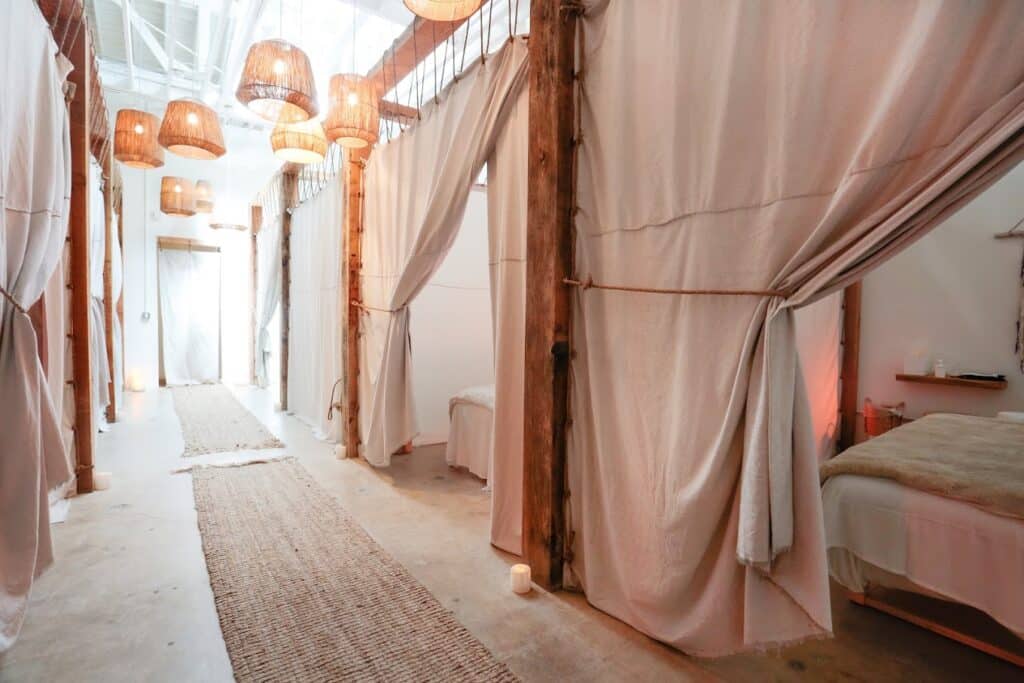
Each The NOW Massage location is designed with a minimalist aesthetic that incorporates raw elements and natural materials to create a soothing oasis. Interiors feature natural wood surfaces and exposed beams coupled with sheep skins and rawhides, cactus galleries and crystal grids, setting the tone for a relaxing experience.
Grand opening specials
To celebrate the boutique’s grand opening week from October 21–28, all massage bookings will receive a complimentary enhancement. Guests can choose from two of The NOW’s best-selling signature add-on treatments to amplify their therapeutic massage, including Herbal Heat Therapy, in which heat packs are used on the neck and back during treatment to provide a deeper sense of relaxation or Fresh Eyes, a soothing, hydrating eye mask with vitamins and antioxidants.
For guests who want to make massage a regular part of their monthly or bi-monthly self-care routine, The NOW also offers Ritual Membership packages that include savings on massages, roll over credits, perks and more.
The first 50 guests to join as a Ritual Member at the Peachtree Corners location will receive a complimentary curated gift bag filled with a selection of best-selling products from the company’s Nourish, Scent and Room collections.
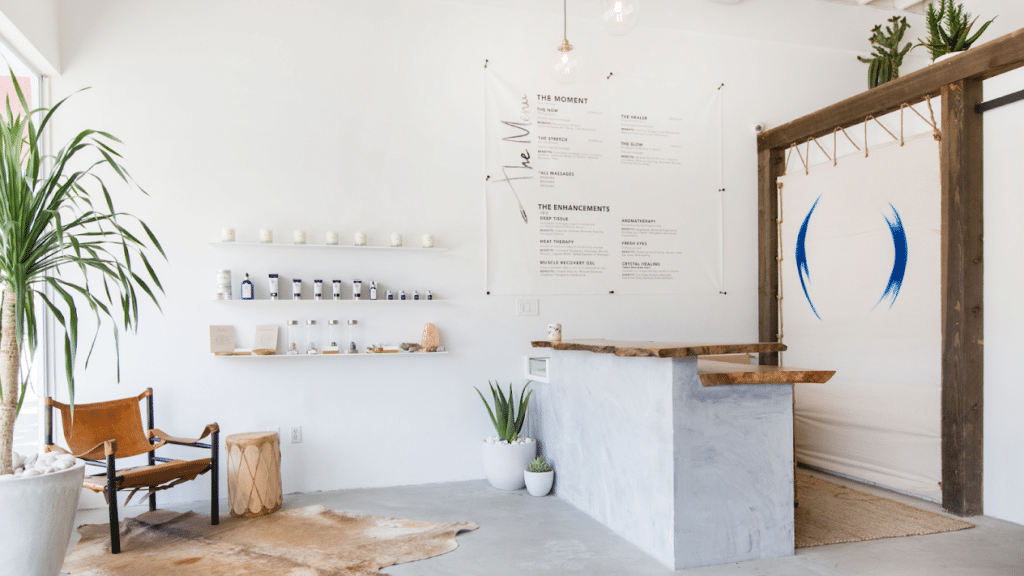
With boutiques currently open from coast to coast and steady expansion on the horizon, The NOW Massage is excited to bring its thoughtfully crafted menu, healing products and signature design to The Forum in Peachtree Corners and to other cities across the United States.
For more information or to book a massage, visit thenowmassage.com/peachtree-corners.
Related
Read the Digital Edition
Subscribe
Keep Up With Peachtree Corners News
Join our mailing list to receive the latest news and updates from our team.
You have Successfully Subscribed!

Official City Merchandise Line Debuts This Saturday at Town Green

Peachtree Corners Hosts Discussion About the Future of Local Policing

Executive Function: A Tribute to Working Moms

Peachtree Corners Grows Business Opportunities Through Economic Development

D1 Training Brings New Fitness Concept to Peachtree Corners

Simpson Elementary Marks Exceptional Children’s Week

City of Peachtree Corners Awarded Certificate of Achievement From GFOA for Seventh Straight Year

Atlanta’s Dog Howl-O-Ween Festival Moving to Peachtree Corners for 2025

MomoCon 2025 to bring 60,000 Fans to Atlanta for a Weekend of Cosplay, Animation, Gaming and Music

Local Special Olympics Pickleball Team Honored with State House Resolution

Atlanta’s Dog Howl-O-Ween Festival Moving to Peachtree Corners for 2025

D1 Training Brings New Fitness Concept to Peachtree Corners

Peachtree Corners Hosts Discussion About the Future of Local Policing

City of Peachtree Corners Awarded Certificate of Achievement From GFOA for Seventh Straight Year

Simpson Elementary Marks Exceptional Children’s Week

Executive Function: A Tribute to Working Moms

Light up the Corners [Video]

Capitalist Sage: Business Leadership in Your Community [Podcast]

Cliff Bramble: A Culinary Adventure through Italy

Top 10 Brunch Places in Gwinnett County

A Hunger for Hospitality

THE CORNERS EPISODE 3 – BLAXICAN PART 1

Top 10 Indoor Things To Do This Winter

The ED Hour: What it takes to Remove Barriers from Education

Peachtree Corners Life
Topics and Categories
Trending
-
Pets & Animals5 days ago
Atlanta’s Dog Howl-O-Ween Festival Moving to Peachtree Corners for 2025
-
Around Atlanta3 days ago
MomoCon 2025 to bring 60,000 Fans to Atlanta for a Weekend of Cosplay, Animation, Gaming and Music
-
Sports4 days ago
Local Special Olympics Pickleball Team Honored with State House Resolution



